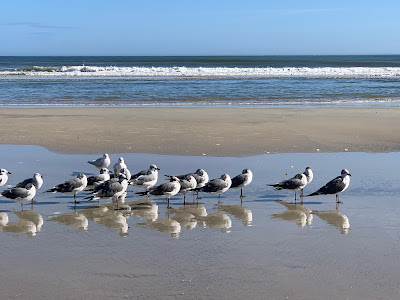 |
| Florida, Jan 2019, J. Doolittle |
What is Poetry?
A librarian is always surrounded by facts and fiction, whether on the shelves, online or in the world around her. It's her challenge and her joy to revel in the fantasies and stories that enrich our hearts and souls and to cut out the fallacies and dead ends to get to the truth. This blog is about a personal and professional search for both truth and fiction and how to tell the difference.
Instructions for living a life: Pay attention. Be astonished. Tell about it.
Mary Oliver
 |
| Florida, Jan 2019, J. Doolittle |
Future Ark
Open Secrets
Little Girl as Earthquake Lit by Stars
 |
| Photo image created by Jean Doolittle original 9/2015, Greenport, NY |
"Life begins at 40" is often associated with a book written by Walter Pitkin in 1934 and has become something of an axiom in the 20th and 21st centuries. People in previous centuries weren't saying that because the average lifespan was so much shorter in the past; there usually wasn't much life left after 40. In our lifetimes, however, modern medical advances and decreases in infant mortality gave more and more people the opportunity to add other chapters to their lives in the years after establishing careers and childbearing and childrearing. The "mid-life crisis" was born along with that opportunity. If you had more life, what would you do with it?
I remember feeling somewhat overwhelmed with life's responsibilities at that time, sensing that I should have had more figured out and put into place by then and since I did not, just wanting to get away from it all. I had even picked out a place to disappear to...White River Junction, Vermont. Having never been to Vermont, I had no real idea of what it would be like there; just that Vermont was far away and seemed quiet, pastoral and the leaves would be beautiful in the fall.
I never packed up and went to Vermont and I don't think my family ever knew how seriously I was considering it. Instead I did do sometimes for myself outside of my home. I signed up for writing classes at the Loft. One of those classes was poetry writing with John Reinhard. The other aspiring poets in the class were enthusiastic and very talented and we continued to meet and critique each other's work long after the class was over. Several have published their poems in books and poetry anthologies...talented, indeed.
John is a great teacher and an outstanding poet. A few years after my class with him, he was one of the winners of the 1998 McKnight Arts Fellowships for Writers and his work was published in this anthology that I'm featuring, along with some other powerhouse Minnesota writers you may have heard of: Leslie Adrienne Miller (poet, collage artist and professor at St. Thomas) David Mura (Japanese-American poet, non-fiction writer, playwright and performance artist), Kate DiCamillo, Newbery Award winning children's writer) and William Kent Krueger (best-selling mystery writer, known for the Cork O'Connor series).
I love the imagery of this poem and I remember that John told us about it origins; I only wish I remembered the story he told, but somehow I find myself singing "Lucy in the Sky With Diamonds" when I read it.